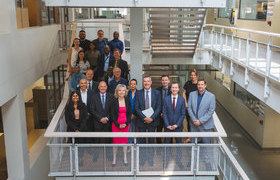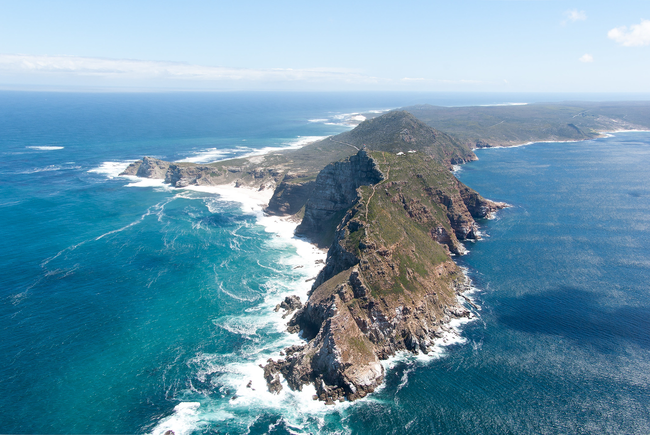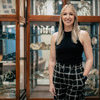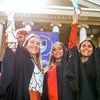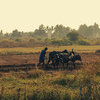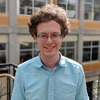The first time I visited CERN, I was speechless – Chilufya Mwewa
23 November 2016 | Story Ambre Nicolson. Main Photo Supplied.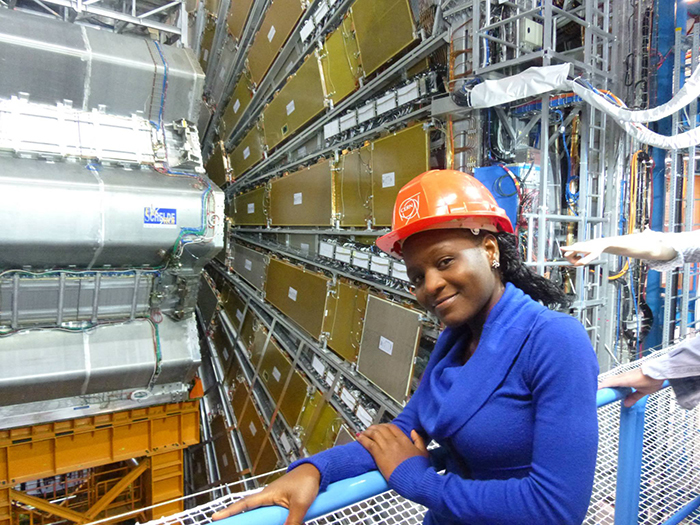
Every year, CERN’s ATLAS project awards a special PhD grant to between three and eight young researchers from around the world. The grant provides funding for two years of thesis research, including a full year based at CERN. Chilufya Mwewa, a Zambian-born particle physicist currently completing her PhD at UCT, can now count herself among their number.
CERN, or the European Organisation for Nuclear Research, is most famous for being home to the Large Hadron Collider. The LHC is, however, only the end point in a series of accelerators. When particles of matter have reached sufficient speeds, they are set on a collision course inside one of four detectors: ATLAS, ALICE, CMS and LHCb. “Basically, we’re talking about the collision of fundamental particles,” explains Dr Andrew Hamilton, senior lecturer in the Department of Physics and one of Mwewa’s supervisors (Dr Sahal Yacoob being the other). “In the case of ATLAS, it is proton collision that is being studied; another detector called ALICE is dedicated to studying the collision of heavy nuclei, such as lead.”
In both cases, researchers based at universities around the world work remotely to understand the vast amounts of data produced by these experiments. The SA-CERN Consortium, an inter-university network, funds the participation of UCT and other South African universities in this research. Through this consortium, and thanks to funding from the Department of Science and Technology (DST), students are given the opportunity to participate in this research and to visit CERN.
It was through this research avenue that Mwewa first went to Switzerland. “The first time I visited CERN, I was speechless,” she remembers. “To be a part of that environment, where the world’s finest physics minds are studying the fundamental particles that make up our universe, was an indescribable feeling.”
It was while she was at CERN earlier this year that Mwewa’s supervisors encouraged her to apply for the grant. At the time Mwewa did not feel confident that she would be considered eligible. But, with Hamilton and Yacoob’s encouragement, she applied anyway.
Mwewa’s fascination for physics started long before her visit to CERN. “Even in high school I showed an aptitude for physics, or at least I wasn’t as good at chemistry. I didn’t think physics was going to be my career, though!”
After she completed her BSc in Zambia, she won funding to come to South Africa to do a postgraduate course through the African Institute of Mathematical Studies (AIMS). “While I was there I was inspired by Professor Robert Mann, a physicist based at Waterloo University, to become interested specifically in high energy physics. Later I met Andrew Hamilton and chose to do my master’s degree at UCT.”

Why high energy physics? For Mwewa studying these tiny building blocks of matter is endlessly fascinating. “This is what our incredibly complex universe is made out of,” she says. “There is so much we don’t know: I mean, how can you not be curious?”
Her curiosity and all her hard work were rewarded when she recently learned that she had won the grant. “It really felt like a recognition of my potential,” she says, “but it also made me feel like I have even more of a responsibility to work hard. One day I would really like to be a part of cutting-edge experiments, and being awarded this grant will help me to achieve this aim.
“Although I have never thought of myself as a role model, if I can inspire a girl who is now in school to get into physics, that would make me happy.”
If Mwewa was surprised at winning the grant, her supervisor Yacoob was proud: “Winning such a prestigious award is a recognition not just of being competent but of being outstanding,” he says. “Chilufya has proven that she has the ability to succeed based on her academic ability and diligence.”
The grant also means that Mwewa will have to live away from her one-year-old son and her husband, who will be living in Zambia while she is in Switzerland. “I could never have done this without my husband’s support. It was he who said, ‘You have to take this opportunity, think about what it can do for your future in science’. Between him and my supervisors and the early encouragement I received, I am very grateful.”
Image of ATLAS event by ATLAS Experiment © 2016 CERN.
 This work is licensed under a Creative Commons Attribution-NoDerivatives 4.0 International License.
This work is licensed under a Creative Commons Attribution-NoDerivatives 4.0 International License.
Please view the republishing articles page for more information.
Research & innovation

